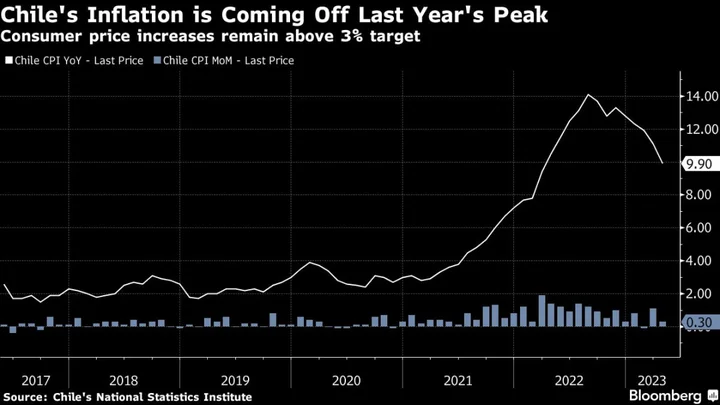Chile’s annual inflation eased back to single digits for the first time since March 2022, offering some relief to policymakers as they hold the benchmark interest rate at the highest in over two decades.
Consumer prices rose 9.9% in April from a year prior, slightly less than the 10% median forecast of analysts in a Bloomberg survey. Monthly inflation stood at 0.3%, the national statistics institute reported on Monday.
Excluding volatile items, inflation eased to 10.3% in April from a year before, versus 10.8% in March, according to the statistics agency. Chile’s central bank targets consumer price increases at 3%.
The report is one of the last pieces of data coming before the central bank’s May 12 policy meeting. Board members led by Rosanna Costa are expected to hold rates steady at 11.25% for the fourth straight time as core inflation remains stubbornly high. Still, investors see borrowing cost cuts starting in the third quarter as domestic demand gradually wanes.
Read more: Chile’s Costa Dismisses Early Rate Cuts, Even as Inflation Slows
What Bloomberg Economics Says
The result brings significant relief, but we believe policymakers may prefer to wait for further data to start cutting rates. We still expect them to hold the rate on May 12. Another favorable print in May could allow the central bank to begin cutting in June — ahead of our current forecast for a third-quarter move.
—Felipe Hernandez, Latin America economist
—Click here for full report
Swap rates fell across the curve following both the inflation report and the triumph of the political right in weekend elections for a new Constitutional Council, with the one-year tenor down by nine basis points.
Recreation and culture costs fell 1.7% on the month in April, while clothing declined 0.2% and food and non-alcoholic beverages were unchanged, according to the statistics institute. On the other hand, health costs jumped by 1.5% and transportation gained 0.8%.
Read more: Chile’s Conservatives Score Huge Win in Challenge to Boric
While Chile’s inflation is slowing down, the nation’s cost-of-living problems are not resolved, Costa said at an event on May 3. Consumer price estimates are above target, and the economy needs to cool further, she said.
Over the past two years, Chile’s economy has been hit by a series of inflationary shocks, including billions of dollars in both emergency spending during the pandemic and early pension fund withdrawals, as well as a jump in commodity costs following Russia’s invasion of Ukraine.
There are signs that consumer price pressures are starting to diminish in other Latin American countries. Brazil’s annual inflation in early April hit the lowest since 2020, while in Peru it decelerated below 8% for the first time in a year.
On the other hand, annual inflation in regional outlier Argentina continues to soar above 100%.
--With assistance from Giovanna Serafim and Rafael Gayol.
(Updates with economist quote and more details from release starting in fifth paragraph)

